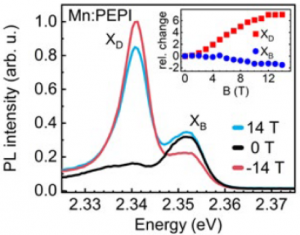Hybrid metal-halide perovskites are known for their simple production as polycrystalline thin films and nanostructures using solution-processing techniques. They also exhibit exceptional tolerance to structural defects and impurities. A new development in the latter respect is the introduction of Mn dopants into the layered perovskite (PEA)2PbI4 thereby inducing paramagnetism in the otherwise diamagnetic host material. The field-dependent magnetization of this new dilute magnetic semiconductor does not show hysteretic behavior and follows the Brillouin function for noninteracting J = 5/2 spin systems, corresponding to a spin alignment of the high-spin Mn d5 configuration. Magneto-photoluminescence measurements furthermore show the emergence of a new signal located at the low-energy side of the bright excitonic peak (Figure). We attribute this emission to the dark state being brightened by magnetic coupling to the bright exciton. In contrast to the nonmagnetic variant, this emission shows a nonzero degree of circular polarization, reaching a value of 13 %, which we find to be directly proportional to the material’s magnetization.
Our findings constitute the first demonstration of magnetization control of exciton spin physics in a transition-metal-doped lead-halide perovskite and provide a first step towards future opto-spintronic functionalities of these materials.
Publication – Manganese doping for enhanced magnetic brightening and circular polarization control of dark excitons in paramagnetic layered hybrid metal-halide perovskites
Neumann, S. Feldmann, P. Moser, A. Delhomme, J. Zerhoch, T. van de Goor, S. Wang, M. Dyksik, T. Winkler, J. J. Finley, P. Plochocka, M. S. Brandt, C. Faugeras, A. V. Stier, and F. Deschler, Nat. Commun. 12, 3489 (2021)

Figure – The circularly polarized PL spectra for Mn-doped PEPI [(PEA)2PbI4]. The inset shows the influence of magnetic field on the relative intensities of both dark (XD) and bright (XB) excitonic states.
